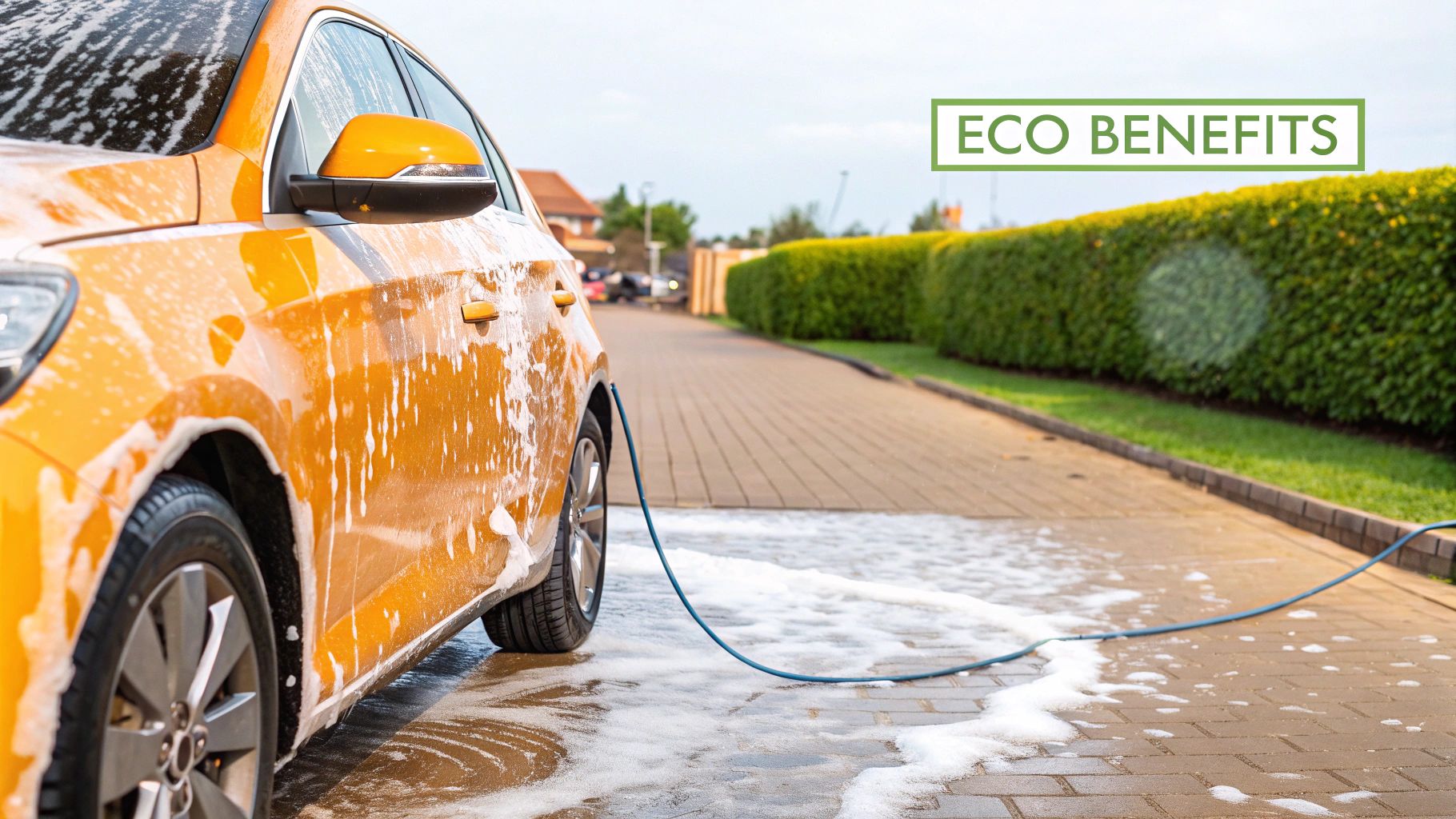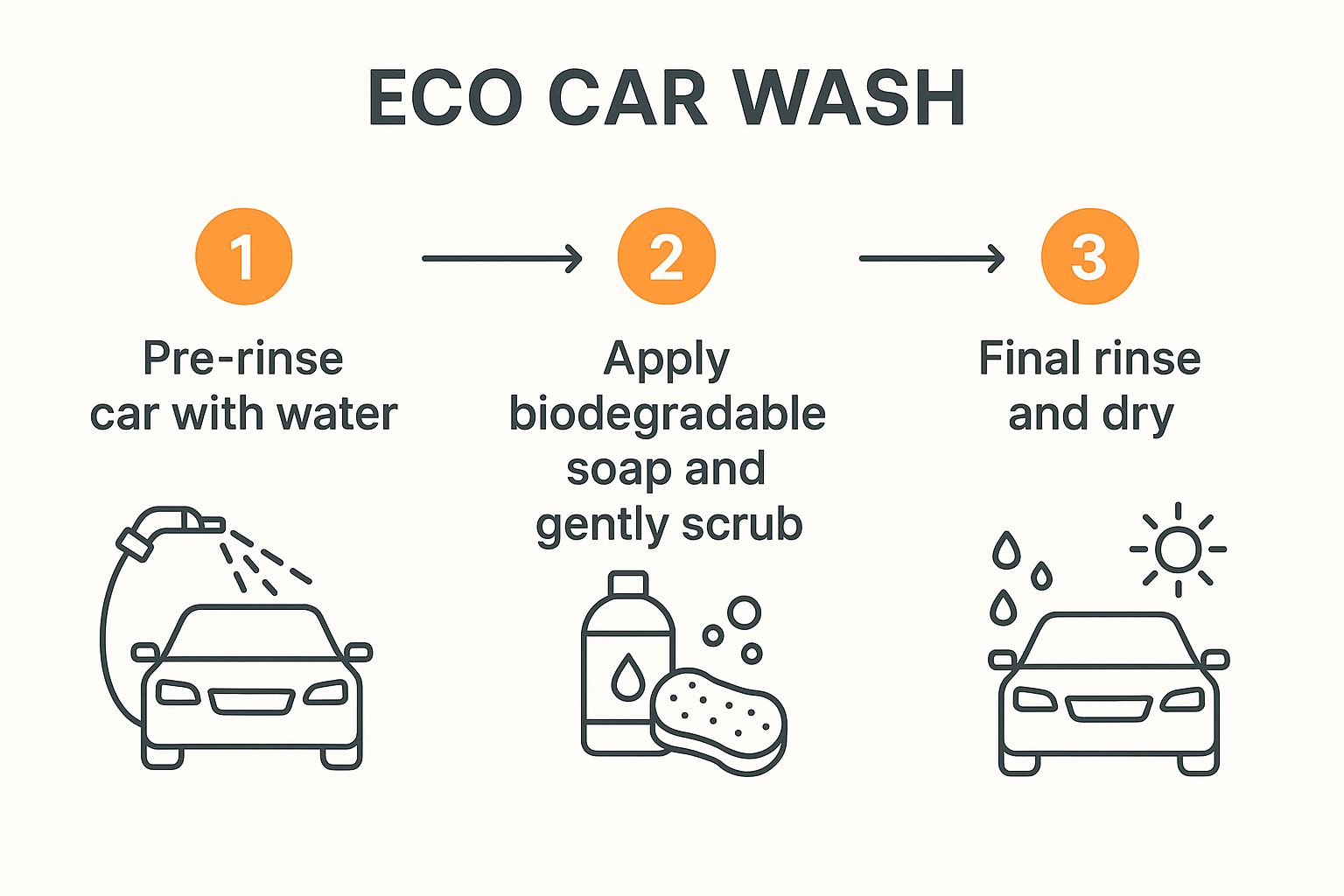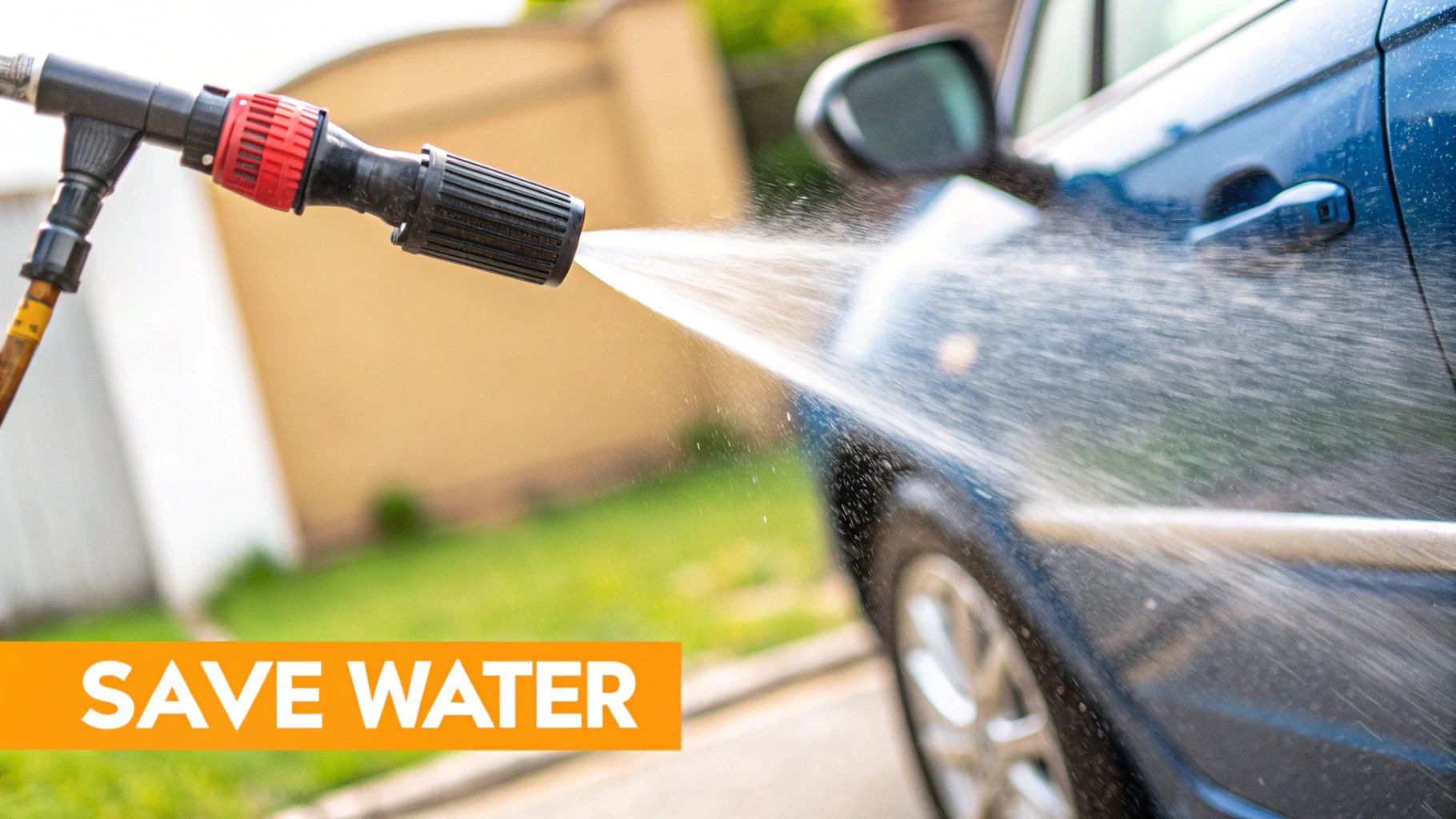What Makes Car Wash Soap Actually Environmentally Safe
Let's face it, "environmentally safe" is a term that's used everywhere these days. It can feel like you're drowning in marketing hype, especially when shopping for car wash soap. What does "biodegradable" even mean when we're talking about your driveway? How can you tell if a product is actually good for the planet, or just good at looking like it is?
One of the biggest changes in car care has been the move away from PFAS (per- and polyfluoroalkyl substances). These chemicals used to be in tons of products, but now we know they stick around in the environment and pollute our water. A truly environmentally safe car wash soap needs to be PFAS-free. That protects the planet and your family.
Another important factor is the use of plant-based surfactants. These are the cleaning agents in soap, and in eco-friendly versions, they come from renewable resources instead of petroleum. Plant-based surfactants break down much faster in the environment, lessening their impact. I've seen some soaps that use coconut oil derivatives, which are super gentle but still get your car clean.
The Shift Towards Sustainable Car Care
It's not just consumers looking for greener options. In the U.S., almost 40% of car wash businesses have started using biodegradable or PFAS-free products. This is partly because of new regulations, like the EPA’s 2023 drinking water standards for PFAS, and partly because people are demanding better choices. Curious about the broader trend towards sustainability in the industry? Check out this overview: U.S. Car Wash Industry Overview. And remember, being eco-conscious with your car extends beyond just soap – regular car maintenance plays a role too.
To help clarify the differences between traditional and eco-friendly car wash soaps, let's look at the ingredients:
Environmentally Safe vs. Traditional Car Wash Soap Ingredients A comparison of common ingredients found in traditional car wash soaps versus their eco-friendly alternatives
| Ingredient Type | Traditional Formula | Eco-Friendly Alternative | Environmental Impact |
|---|---|---|---|
| Surfactants | Petroleum-based | Plant-based (e.g., coconut oil derivatives) | Plant-based options biodegrade more readily, reducing water pollution. |
| Phosphates | Often present | Usually absent | Phosphates contribute to algal blooms, harming aquatic life. Eco-friendly options avoid this. |
| PFAS | Sometimes included | Always excluded | PFAS are persistent pollutants that contaminate water sources. |
| Fragrances | Artificial | Natural or unscented | Artificial fragrances can contain harmful chemicals. |
| Preservatives | Synthetic | Natural | Natural preservatives are less toxic to the environment. |
As you can see, eco-friendly soaps make some crucial swaps for the benefit of the environment.
Getting the Most Out of Your Eco-Friendly Soap
Finally, a truly eco-friendly soap should be concentrated. This cuts down on packaging waste, shipping costs, and even the emissions from transporting it. Plus, you use less soap per wash, shrinking your overall footprint. These concentrated formulas, paired with a foam gun like the SwiftJet, create a thick, clinging foam that really coats your car. You get maximum cleaning power with minimum product. This combo of plant-based ingredients, PFAS-free formulations, and concentrated formulas is what makes a car wash soap truly environmentally safe – and lets you enjoy a clean car without the guilt.
Why Smart Car Owners Are Going Green With Their Soap

There's a real shift happening, and I'm seeing more and more car owners ditching the harsh chemicals and embracing environmentally safe car wash soap. It's not just about feeling good (though that's a bonus!), it's about the real, tangible benefits for your car and your wallet. Honestly, after talking to so many people making the switch, the positive feedback is pretty convincing.
One of the biggest surprises? How many people report that eco-friendly soaps actually improve their car's finish over time. Think about it: those harsh chemicals in traditional soaps can strip waxes and even damage your clear coat after repeated use. Eco-friendly soaps, on the other hand, gently lift dirt without harming the protective layers. That translates to a longer-lasting shine and less need for heavy polishing later on.
Another factor is water. With water restrictions becoming more common, using less water to wash your car is a big plus. Environmentally safe car wash soaps are often concentrated, meaning you need less water for an effective clean. This not only helps conserve water but also saves you a few bucks on your water bill. Speaking of saving water, you might find this interesting: Washing Car Without Hose - Easy & Eco-Friendly Tips. Even the market is catching on. The car wash detergent and soap market, valued at $10.1 billion in 2025, is projected to grow at a 6.5% CAGR until 2033, with demand for eco-friendly options playing a significant role. In fact, something like 25-30% of new product launches are now focused on sustainability. Pretty impressive, right? Discover more insights.
The Real Benefits of Going Green
Besides the obvious environmental benefits, here are some other perks of using environmentally safe car wash soap that you might not have considered:
- Gentle on Your Paint: Keeps your waxes, sealants, and clear coat in top shape.
- Water Conservation: Concentrated formulas mean less water usage, which is great with increasing water restrictions.
- Cost-Effective: You use less soap per wash, saving you money over time.
- Improved Shine: Gentle cleaning helps maintain that beautiful finish.
- Peace of Mind: Knowing you're doing something good for the environment is a definite plus.
All these benefits make switching to an environmentally safe car wash soap a no-brainer. It's not just a passing trend, it's a real upgrade to your car care routine.
Finding Your Perfect Eco-Friendly Match

Let's talk eco-friendly car wash soaps. I've learned that what works great on one car might not be the best for another. There's actually a lot more to it than you might think. What works for my wife's sedan isn't the same as what I need for my truck after a muddy off-roading trip.
One big thing is your car's paint. A fancy car with a delicate finish needs a much gentler soap than a work truck. How dirty your car is matters too. A quick dusting is different than caked-on mud or bug splat. Even your water can make a difference. I found out the hard way that a plant-based soap I loved left streaks when I used it in a hard water area.
Decoding Eco-Friendly Soap Formulations
Most eco-friendly soaps are plant-based. Some use coconut oil derivatives for a gentle yet effective clean. Others use special blends of biodegradable ingredients, each with pros and cons. Knowing the difference is key to finding the right soap for you.
This ties into the growing global demand for eco-conscious car care. It's interesting that liquid detergents, easier to make with plant-based ingredients, now make up over 70% of the global market for environmentally safe car wash soaps. This shift is especially big in the Asia-Pacific region. You can learn more about the global car wash soap market.
Real-World Scenarios and Product Performance
Think about it: winter road salt needs a powerful soap, while summer bugs require something that breaks down organic matter. From my own testing, some eco-friendly soaps are better at certain things. A citrus-based soap might be amazing for grease but not so great on sensitive finishes. A gentler, pH-balanced soap might be perfect for protecting waxes and sealants.
Understanding Concentration and Value
Concentration is also important. Many eco-friendly soaps are very concentrated, so you only need a little. This saves you money, especially with a foam gun like the SwiftJet. You can make thick foam that cleans really well without using a ton of soap. Pay attention to the recommended dilution ratios; they affect both how well the soap cleans and how long it lasts. It’s like making coffee – the right ratio of water is crucial. Knowing this helps you pick the best environmentally safe car wash soap for your needs, getting the best clean while being kind to the planet.
Mastering Your Green Car Wash Technique

This infographic shows a simple 3-step process for an eco-friendly car wash: pre-rinse, soap and scrub, then rinse and dry. It looks easy, right? But each step has little tricks that can make a big difference in your results. Getting a truly clean car really comes down to understanding how these plant-based soaps work.
With environmentally safe car wash soap, patience is key. These soaps usually use plant-based surfactants, and they act a bit differently than regular detergents. They might need to sit on the car a little longer (dwell time) to really break down the dirt. Don't rush it – letting the soap do its thing means a cleaner car and you’ll use less soap overall.
Fine-Tuning Your Eco-Friendly Wash Routine
Let's get into the specifics. A good pre-rinse is essential. This gets rid of loose dirt and grime so your soap can work on the tougher stuff. I’ve noticed lukewarm water works best for pre-rinsing with eco-friendly soaps. Sometimes cold water just doesn't activate the plant-based surfactants as well.
Dilution is super important too. Eco-friendly soaps are typically concentrated, so a little goes a long way. Too much water and the soap is weak; not enough water and you might end up with streaks or a filmy residue. Follow the instructions on the bottle, but don't be afraid to experiment a little to find what works best with your water and the SwiftJet foam gun. Want to get the most out of your foam gun? Check out this helpful guide: Foaming Car Wash: Top Tips for a Sparkling Finish.
The Rinse and Dry: Finishing Strong
Even rinsing has a technique! Rinsing well gets rid of all the soap, which prevents residue and those annoying water spots. My go-to method is a high-pressure rinse from top to bottom to blast away the soap, followed by a gentler rinse to sheet the water off. This really helps minimize water spots, particularly if you have hard water.
Drying is the final step. A good quality microfiber drying towel is indispensable. It soaks up water quickly and won’t scratch your car. And don’t forget about proper disposal – we’re trying to keep that runoff clean! For helpful tips on handling runoff, you might find this resource useful: install polyethylene tank. By mastering these techniques, you'll get the most cleaning power from your environmentally safe car wash soap while minimizing your impact. It's all about working with the soap, not against it.
To illustrate the differences between a traditional car wash and an eco-friendly approach, take a look at this comparison:
Eco-Friendly Car Wash Routine Comparison: Step-by-step comparison of traditional versus environmentally safe car washing methods
| Wash Step | Traditional Method | Eco-Friendly Approach | Water Usage | Environmental Benefit |
|---|---|---|---|---|
| Pre-Rinse | High-pressure rinse | Moderate-pressure rinse with lukewarm water | Higher | Lower water consumption |
| Soap Application | Often uses harsh chemicals, applied liberally | Plant-based soap, diluted appropriately | Can be excessive due to over-application | Reduced chemical runoff, biodegradable soap |
| Scrubbing | May use abrasive brushes | Microfiber wash mitt or less abrasive brush | N/A | Gentler on car finish, less likely to scratch |
| Rinse | High-pressure rinse | High-pressure followed by gentle rinse | Higher | Optimized rinsing reduces water usage |
| Drying | Often air dried or wiped with any towel | Microfiber drying towel | N/A | Reduced water spots, less waste |
As you can see, adopting an eco-friendly routine not only benefits the environment but can also improve your car washing technique with optimized water usage and gentler cleaning practices.
Performance Reality Check: What Actually Happens
Let's be honest, does eco-friendly car wash soap really clean as well as the traditional stuff? It's the question everyone asks, and it’s one I’ve spent a lot of time testing myself. I’ve done side-by-side comparisons with various soaps – cheap ones, expensive ones, everything in between – in all kinds of weather. Rain, sun, muddy roads...you name it. And the results? Honestly, they surprised me.
In a lot of cases, the eco-friendly options cleaned just as well, sometimes even better, than the regular car wash soaps, particularly for routine washes. I was a bit skeptical initially, thinking they might not have enough cleaning power. But when used with a foam gun like the SwiftJet, the thick foam really clings and works its magic, getting into all those hard-to-reach spots.
I've also chatted with other car owners who’ve switched, and their experiences are similar to mine. Many were hesitant at first, but after seeing the results firsthand – a sparkling clean car, a nice shine, and knowing they’re being kinder to the environment – they're totally on board.
This screenshot from the EPA website shows how seriously they're taking PFAS, those nasty chemicals often found in conventional car care products. Seeing the government take action is a big motivator for me to choose PFAS-free, environmentally safe car wash soaps.
Where Eco-Friendly Soaps Excel
For regular maintenance washes, eco-friendly soaps are fantastic. They're gentle on your car’s paint, meaning less chance of damaging the clear coat over time. This is a huge plus in the long run – your paint stays in better shape, and you won’t need to resort to harsh polishes as often.
When You Might Need a Little Extra
Okay, full transparency here. There are times when eco-friendly soaps might need a slightly different approach. For seriously stubborn grime, like caked-on mud or bug splatters, you might need to pre-soak the area or use a bit more soap. Don’t give up! It’s just about finding the right technique.
Our guide on washing frequency offers some useful tips: How Often Should You Wash Your Car?. It's a bit of a learning curve, and you might need to experiment for a few washes to find what works best. But take it from me, the benefits for your car and the environment are definitely worth it.
Smart Shopping: Getting Quality Without Breaking The Bank

Going green with your car wash routine doesn't mean you have to sacrifice your savings. Trust me, I've been there. I've figured out how to keep my ride gleaming and my bank account happy. The key is looking beyond the sticker price and understanding the real value. For example, a lot of eco-friendly car wash soaps are super concentrated. A small bottle might seem expensive at first, but it actually lasts much longer than regular soap, giving you more washes for your money.
Bulk Buying and Smart Shopping Strategies
I'm a big fan of buying in bulk. You can often snag a serious discount when you purchase a larger quantity, especially with those concentrated formulas. A gallon of concentrate can last a surprisingly long time.
Keep an eye out for seasonal sales, too. Lots of retailers offer discounts on car care products during spring cleaning or end-of-summer promotions. Think of it as a little treat for your car and your wallet.
Another trick I've used is subscribing to a regular delivery service for my car wash soap. Some companies offer fantastic subscription deals, and it takes the mental load off remembering to buy more. No more last-minute panics when you realize you're running low! Plus, you sometimes get extra perks like free microfiber towels or discounts on other car care goodies.
DIY Enhancements and Hidden Cost Savings
Here’s a fun tip: You can often boost the cleaning power of your eco-friendly soap with a few simple DIY additions. Adding a small amount of carnauba wax to your soap mix can give your car extra shine and protection. I’ve also experimented with adding a bit of citrus oil, which leaves a fresh scent and helps tackle stubborn dirt and grime. Just remember to test any DIY additions on a small, hidden area of your car first.
One of the biggest hidden savings with eco-friendly soaps is the gentle, long-term protection they offer your car’s paint. Because they're free of harsh chemicals, they're much kinder to your car’s finish. This means less risk of fading, oxidation, and those annoying swirl marks that can require expensive polishing to remove. So, by protecting your paint now, you’re actually saving money on future detailing work. It's like a long-term investment in your car's appearance.
Avoiding Common Shopping Mistakes
Here's the deal: just because a soap says "eco-friendly" doesn't automatically make it a good value. Some brands charge a premium for the “green” label without actually offering better performance. Take a good look at the ingredients, concentration levels, and – this is important – customer reviews before you buy anything. Don't be fooled by fancy marketing or inflated prices. Remember, a higher price tag doesn’t always equal a better product. By being a smart shopper and understanding what truly matters in a car wash soap, you can keep your car sparkling without emptying your wallet. It's all about striking the right balance between being environmentally conscious and budget-savvy.
Your Roadmap To Eco-Friendly Car Care Success
So, you're ready to ditch the harsh chemicals and go green with your car washes? That’s awesome! This isn't about a sudden, drastic overhaul. It's about making small, sustainable changes that work for you and the planet. Let's figure out a realistic plan to bring environmentally safe car wash soap into your routine, one step at a time.
Assessing Your Current Routine
First, let's take a look at what you're doing now. What kind of soap are you using? How often do you wash your car? What are your biggest cleaning headaches – like stubborn bugs or road grime? Knowing this helps you find the best eco-friendly products and set realistic expectations. A good car maintenance checklist can also be super helpful for keeping your car in top shape.
Starting Small and Tracking Your Progress
I always recommend starting with a small experiment. Try your new eco-friendly car wash soap on just one section of your car, like the hood or a door. Compare the results to your usual soap. Does it clean as well? Any difference in the shine or how the paint feels? This hands-on approach lets you see the benefits firsthand, which makes the switch feel less daunting.
Building Sustainable Habits
Once you’re happy with how your chosen eco-friendly soap performs, gradually work it into your full car wash routine. You might need to tweak your technique a bit. Plant-based soaps sometimes act a little differently than traditional detergents. They might need different dilution ratios or dwell times. This is where a SwiftJet foam gun is a game-changer! It lets you fine-tune the foam consistency and application to get the best clean.
Addressing Challenges and Staying Motivated
Switching to anything new can have its hiccups. You might find the eco-friendly soap struggles with really tough grime. Don't give up! It just means tweaking your strategy. Pre-soaking, using a slightly stronger mix, or adding a natural cleaning boost like citrus oil can work wonders. The key is to be flexible and keep trying things until you find your groove. And remember your "why"—a cleaner car and a cleaner conscience. Celebrate those wins, big or small, and remind yourself of the positive impact you're making.
Ready to see what the SwiftJet fuss is all about? Upgrade your car wash with the SwiftJet foam gun and discover a faster, more efficient, and eco-conscious way to keep your car sparkling. Visit SwiftJet today!
